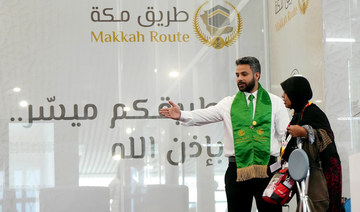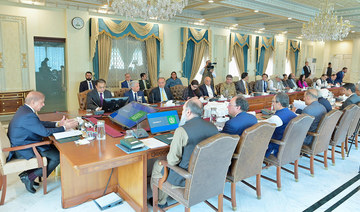ISLAMABAD: Pakistan’s former premier Nawaz Sharif on Saturday blamed the country’s security establishment for conspiring against his administration ahead of the 2018 general elections and bringing Prime Minister Imran Khan to power.
In an unprecedented development, he accused the sitting army chief and director general of Inter-Services Intelligence of driving him out of power, claiming that his government was otherwise performing well.
Sharif, who is on a medical bail and currently resides in London, was addressing an anti-government rally organized by the opposition Pakistan Democratic Movement (PDM) in Gujranwala via video link.
The top Pakistan Muslim League-Nawaz (PML-N) leader previously made similar statements, claiming there was a “state above the state” in Pakistan. However, this was the first time he named serving army officers, though the country’s top military brass had requested politicians not to drag them into politics only a few weeks ago.
Sharif was disqualified from politics by the country’s superior judiciary in July 2017 and was later convicted by an accountability court on corruption charges that he vehemently denies.
Local courts have already issued his arrest warrants and directed the Pakistan Tehreek-e-Insaf (PTI) government to bring him back to face more corruption references against him.
Last month, opposition parties formed the PDM alliance and decided to launch an anti-government campaign by using the platform.
The alliance plans to hold public gatherings across the country in the next several weeks, and Friday’s Gujranwala rally, which brought together leading opposition politicians, was arranged to kick off the nationwide political campaign.
Sharif’s daughter and political heir-apparent, Maryam Nawaz, also addressed the gathering, saying no one should be allowed to oust the country’s democratically elected leaders.
“Governments should come through your vote,” she told thousands of people gathered at a stadium in Gujranwala, “and nobody else should have the right to dislodge an elected administration. You’ve to do the accountability, and if somebody else does this, then you should have to deal with them.”
“When the vote is not honored,” she continued while criticizing the ruling PTI administration, “then the public has to suffer like you are suffering today. Imran Khan has been trumpeting about corruption, but you all will be shocked when stories of his corruption come out in the public.”
The PML-N vice president also criticized the prime minister for making repeated statements that his government and state institutions were on the same page, saying: “Let me remind you that it doesn’t take much time to turn over the page.”
The PDM rally was also attended by the top Pakistan Peoples Party leader, Bilawal Bhutto Zardari, who focused on rising inflation and criticized the government’s economic policies.
“People are worried and economy has nosedived,” he said. “Is this the change the PTI promised? The change is that unemployment, inflation and poverty have hit a historic high today.”
He also alleged that a one-sided accountability drive was being carried out in the country.
“We want end to corruption, equality of law and accountability. You can hold former presidents and prime ministers accountable, but there should also be accountability of judges and generals on corruption charges,” he maintained.
Maulana Fazlur Rahman of the Jamiat-e-Ulama-e-Islam party and the president of the opposition PDM alliance also spoke on the occasion, predicting a political change in the country in the foreseeable future.
“The days of fake ruler are numbered as all democratic forces of Pakistan have launched the movement,” he said. “The rulers will not be in power until December this year.”
“Our struggle will continue until the supremacy of the constitution and apology of the institutions,” he added. “Countries are run through responsibility and commitment, not through confrontation, and we will achieve that target by making collective effort.”
The government formally announced that the opposition alliance could hold its gatherings at specifically designated spots. Federal Minister for Information and Broadcasting Senator Shibli Faraz said the PTI administration had allowed the rallies as “protest is the right of every political party.”
PM Khan’s PTI party came into power in August 2018 after defeating all major opposition parties. The opposition alliance has, however, said the party won a rigged election, which the government denies.
So far, there has been no official response to the allegations opposition parties made during the rally.
Pakistani opposition accuses security establishment of meddling in politics
https://arab.news/gswtz
Pakistani opposition accuses security establishment of meddling in politics
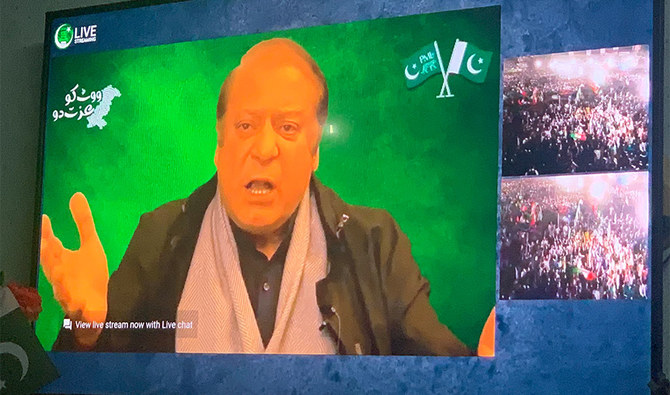
- At a rally in Gujranwala, PML-N’s Maryam Nawaz says no one should be allowed to topple democratically elected administrations
- PPP’s Bilawal Bhutto Zardari questions PTI’s narrative of change, saying ‘people are worried and economy has nosedived’
Pakistan Cricket Board reviews venue upgrades in meeting ahead of ICC Champions Trophy 2025
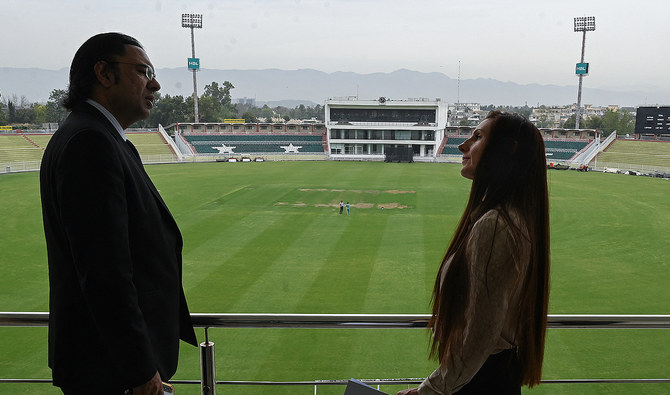
- PCB chairman says upgradation work has been delayed, asks authorities to hire international consultant
- It will be the first major international cricket tournament hosted solely by Pakistan since the 1996 World Cup
ISLAMABAD: The Pakistan Cricket Board (PCB) held a meeting at its headquarters in Lahore to review the upgradation plan for major cricket venues in the country on Saturday ahead of the two-week ICC Champions Trophy next year.
The meeting was presided over by the PCB chairman, Mohsin Naqvi, who directed the relevant officials to immediately hire international consultant to upgrade the Qaddafi Stadium Lahore, National Bank Stadium Karachi and Rawalpindi Stadium.
“The stadium upgradation work has already been delayed,” he observed during the meeting according an official PCB statement, instructing the authorities to speed up the process.
He also instructed to form a three-member committee to ensure the hiring process was carried out in keeping with the rules and regulations.
The PCB plans to provide world-class facilities at the three Pakistani cricket stadiums.
Its upgradation plan includes structural changes to the boxes along with improved facilities and numbered seats for spectators.
Additionally, the number of seats in the enclosures on both sides of the main gate of the Qaddafi Stadium will also be increased.
The PCB chairman directed the replacement of screens for scoreboards and live streaming, instructing the officials to prepare the feasibility to install new floodlights in the stadiums.
The ICC Champions Trophy is scheduled to take place in Pakistan from February to March 2025.
It is expected to be a significant event since it will mark the first major international cricket tournament hosted solely by Pakistan since the 1996 Cricket World Cup.
The tournament will include top-ranked One Day International (ODI) teams, with Pakistan having automatically qualified as the host nation.
‘No illegal Afghan nationals,’ seminary board declares as Pakistan’s Sindh plans crackdown
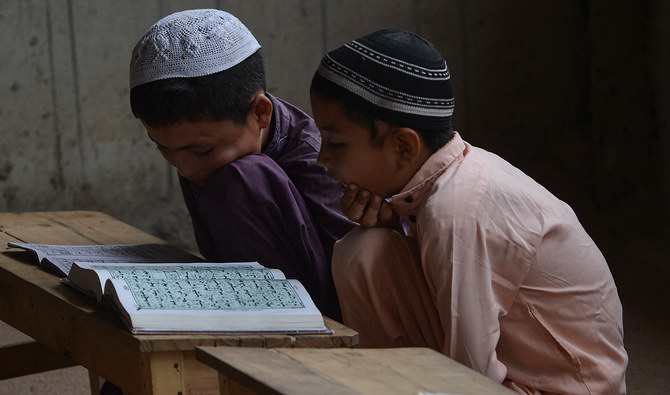
- The province took the decision after a security meeting was told a madrasah teacher was involved in 2023 KPO attack
- Independent analysts say Afghans involve in militant violence arrive from their country and are not residents of Pakistan
KARACHI: Pakistani seminaries have stopped giving admission to Afghan nationals except for those who approach them with the interior ministry’s approval, a top seminary board official informed Saturday, after the country’s southern Sindh province announced to deport illegally enrolled foreigners in seminaries and other educational institutions.
The decision was taken after the province’s apex committee, the top security forum, was briefed earlier this week that one of the individuals involved in the 2023 Karachi Police Office (KPO) attack was a madrasah or seminary teacher. It was also pointed out during the meeting that a number of unregistered foreigners were studying in such institutions in different parts of Sindh.
The 2023 attack was launched by militants, armed with guns and grenades, who stormed the building, leading to a prolonged gunfight with security forces. This confrontation resulted in casualties among both police officers and civilians, along with substantial damage to the police facility. The KPO attack was claimed by the banned militant network Tehreek-e-Taliban Pakistan (TTP), whose leadership is reportedly based in neighboring Afghanistan.
Speaking to Arab News, Maulana Talha Rehmani, spokesperson of Wafaq ul Madaris Al-Arabia Pakistan, said local seminaries had stopping enrolling Afghan nationals almost a year ago.
“Our madrasah used to offer admission to Afghan refugees who possessed proof of registration cards,” he said. “But that also stopped a year ago.”
“Different Pakistani intelligence agencies frequent seminaries for information,” he continued. “Nothing is hidden. The madrasas have a proper system of registration. We are ready to cooperate.”
Rehmani said the authorities had not shared any details with them about the identity of the seminary teacher involved in the KPO attack.
However, Dr. Aamir Tuaseen, former chairman of Pakistan Madrasah Education Board, noted seminaries lacked any coherent policy to develop “a monitoring system” for students.
“Admissions are granted to students without proper background checks,” he told Arab News. “The admission authorities also overlook which province or country does a student belong to, especially in case of Afghanistan.”
He added that boards of religious seminaries should take it upon themselves to grant admission only to students from the city where the seminary is located.
“This will help gather information about the background of every student,” he said, noting the current directorate of religious education did not seem to be fully functional.
The provincial information minister, Sharjeel Inaam Memon, did not respond to a request for comment, but a police official told Arab News on condition of anonymity the madrasah teacher involved in the KPO attack was a Pakistani national.
“The madrasah teacher was identified as Aryadullah who worked with a Karachi-based seminary,” the official said. “He was Pakistani citizen.”
Ihsanullah Tipu Mehsud, a security expert who manages an online publication, The Khorasan Diary, said the Afghan nationals involved in militant violence in Pakistan mostly arrived from the neighboring state and were not residents of Pakistan.
“The involvement of Afghan nationals in acts of terrorism cannot be ignored, but in my opinion, the government’s assertion is overstated,” he said. “The individuals involved in recent acts of terrorism are primarily those who have arrived directly from Afghanistan to carry out attacks rather than Afghan refugees.”
He emphasized any measures related to the expulsion of Afghan students from seminaries should not be driven by a reactionary approach.
“It is critical to implement gradual [seminary] reforms in accordance with the national action plan,” Mehsud said.
Saudi business delegation to arrive in Pakistan Sunday to explore investment opportunities — minister
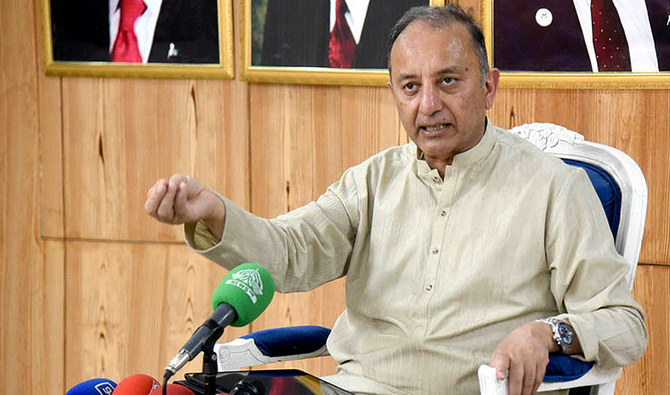
- Musadik Malik says Saudi investment will mainly benefit small technology firms run by young Pakistani students
- He informs the two sides have also discussed a new refinery for export purposes that will help with foreign revenue
ISLAMABAD: A high-level Saudi business delegation is scheduled to arrive in Pakistan tomorrow to explore investment opportunities in various economic sectors by holding meetings with private sector organizations, said Federal Minister for Petroleum Musadik Malik during a media briefing held in Lahore on Saturday.
The two countries have witnessed a flurry of official visits in recent weeks, with Saudi Foreign Minister Prince Faisal bin Farhan traveling to Islamabad earlier in April, before Prime Minister Shehbaz Sharif’s two-day visit to the kingdom to attend a World Economic Forum meeting and hold a number of meetings.
“The Saudi Deputy Investment Minister is visiting Pakistan tomorrow,” said Malik, who is also the focal person for Saudi-Pak bilateral collaboration. “He is bringing representatives from 30 to 35 companies whose CEOs are coming here.”
The Pakistani minister maintained his country had always cherished cordial ties with the kingdom, though it had not managed to turn this “relationship of friendship into a relationship of stability and progress.”
He said Pakistan mostly discussed its financial concerns with the Saudi authorities and requested their support. However, the present government wanted to change that by focusing its bilateral conversations on mutually beneficial progress and development, not aid and assistance.
The minister said the two sides discussed a new refinery project during the recent engagements that would be used for export purposes to earn foreign revenue. Additionally, food security was also discussed to further strengthen Pakistan’s agricultural sector.
He informed that Prime Minister Sharif wanted the country’s “private sector to take the lead on this path to progress.”
“That is why Saudi investors have been invited to come here,” he continued. “They will sit with Pakistani companies and figure out ways to connect the Pakistani talent with the capital and investment needed at the international level for the IT revolution.”
Malik said the bilateral collaboration would primarily benefit small businesses, particularly the technology companies established by young students who were likely to get significant amount of investment from Saudi entrepreneurs.
He expressed optimism that chemical, energy and agricultural companies would also gain advantage from the ongoing bilateral collaboration between the two sides.
Pakistan committee discusses development of border areas in inaugural session
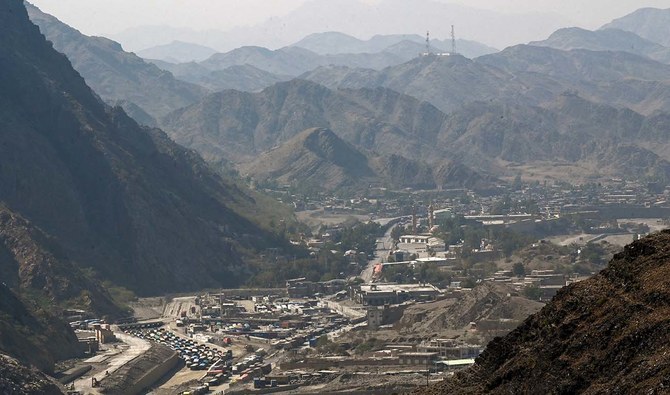
- The committee was formed to devise comprehensive strategies for holistic development in Pakistan’s border regions
- Key topics that came under discussion at the inaugural session included tariff rationalization, employment creation
ISLAMABAD: A high-level committee tasked with development of Pakistan’s border regions on Saturday held its inaugural session in Islamabad to discuss the challenges facing communities based in the country’s frontier regions, the Pakistani commerce ministry said.
The inaugural session of the committee, which was formed to devise comprehensive strategies for holistic development in these areas, was presided over by Commerce Minister Jam Kamal Khan, according to the ministry.
Key topics that came under discussion at the meeting included tariff rationalization and employment creation, reflecting the committee’s commitment to addressing border communities’ challenges.
“The committee aims to present its recommendations to the Prime Minister within 10 days, signaling a promising start to collaborative efforts for socio-economic development in the region,” the commerce ministry said in a statement.
Pakistan shares a long, porous border with Iran and Afghanistan, with people live along it relying on cross-border trade with little or no government tariffs, quotas, subsidies or prohibitions.
Islamabad last year announced restrictions on the informal trade to discourage smuggling of goods and currency in order to support the country’s dwindling economy.
Pakistan’s trade with China mostly takes place through formal channels, while the country’s trade ties with India, another neighbor it shares border with, remain suspended since 2019 over the disputed region of Kashmir.
Pakistan records ‘wettest April’ in more than 60 years — weather agency
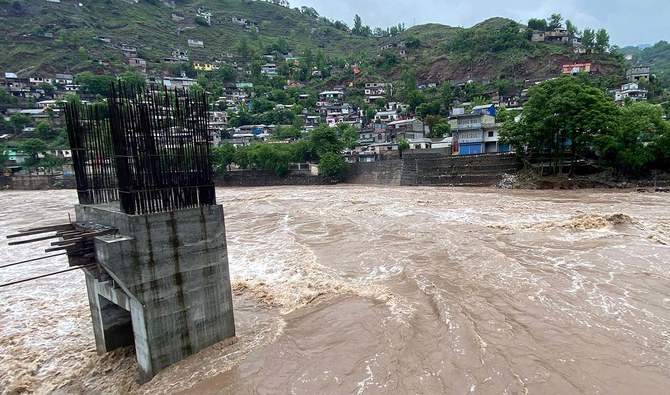
- Pakistan’s metrology department says April rainfall was recorded at 59.3 millimeters, ‘excessively above’ the normal average of 22.5 millimeters
- There were at least 144 deaths in thunderstorms and house collapses due to heavy rains in what the report said was the ‘wettest April since 1961’
ISLAMABAD: Pakistan experienced its “wettest April since 1961,” receiving more than twice as much rain as usual for the month, the country’s weather agency said in a report.
April rainfall was recorded at 59.3 millimeters, “excessively above” the normal average of 22.5 millimeters, Pakistan’s metrology department said late Friday in its monthly climate report.
There were at least 144 deaths in thunderstorms and house collapses due to heavy rains in what the report said was the “wettest April since 1961.”
Pakistan is increasingly vulnerable to unpredictable weather, as well as often destructive monsoon rains that usually arrive in July.
In the summer of 2022, a third of Pakistan was submerged by unprecedented monsoon rains that displaced millions of people and cost the country $30 billion in damage and economic losses, according to a World Bank estimate.
“Climate change is a major factor that is influencing the erratic weather patterns in our region,” Zaheer Ahmad Babar, spokesperson for the Pakistan Meteorological Department, said while commenting on the report.
While much of Asia is sweltering dure to heat waves, Pakistan’s national monthly temperature for April was 23.67 degrees Celsius (74 degrees Fahrenheit) 0.87 degrees lower than the average of 24.54, the report noted.



